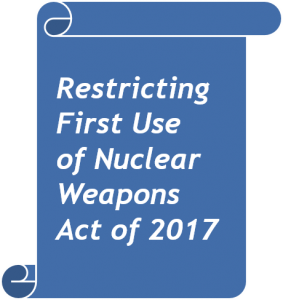On January 25, 2017, Sen. Edward Markey (D-MA) and Rep. Ted Lieu (D-CA) introduced companion bills to prohibit the President from launching a nuclear first strike without a declaration of war by Congress.
A copy of the bill is below.
A version of the bill was first introduced in 2016 when Barack Obama was President; the measure is directed at all Presidents and not just President Donald Trump.
Council for a Livable World has enthusiastically endorsed the Markey-Lieu bills: S.200 in the Senate and H.R. 669 in the House.
Council executive director John Tierney, a former Member of Congress, argued, “A decision to use nuclear weapons could mean the end of civilization. Such a momentous pronouncement in the absence of an attack on the United States should not rest in the hands of only one individual.”
Markey said it is vital for Congress to consider the bill, “Neither President Trump, nor any other president, should be allowed to use nuclear weapons except in response to a nuclear attack.”
He added, “Nuclear war poses the gravest risk to human survival. Yet, President Trump has suggested that he would consider launching nuclear attacks against terrorists.”
Rep. Lieu commented, “Congress must act to preserve global stability by restricting the circumstances under which the U.S. would be the first nation to use a nuclear weapon. Our Founders created a system of checks and balances, and it is essential for that standard to be applied to the potentially civilization-ending threat of nuclear war.”
Former Defense Secretary William J. Perry has endorsed the bill, saying ““During my period as Secretary of Defense, I never confronted a situation, or could even imagine a situation, in which I would recommend that the President make a first strike with nuclear weapons—understanding that such an action, whatever the provocation, would likely bring about the end of civilization.”
The aim of the bill’s sponsors and supporting organizations is to build support for the measure in coming months and consider bringing up the bill as an amendment during annual consideration of the Fiscal Year 2018 National Defense Authorization bill later in the year.
The bill
S. 200 [An identical bill, H.R. 669, was introduced in the House of Representatives by Ted Lieu of California, Jim McGovern (Ma), John Garamendi (CA), Yvette Clarke (NY), Earl Blumenauer (OR), Raul Grijalva (AZ), Mark Pocan (WI), Barbara Lee (CA) and Peter Welch (VT)]:
To prohibit the conduct of a first-use nuclear strike absent a declaration of war by Congress.
IN THE SENATE OF THE UNITED STATES
Mr. MARKEY introduced the following bill; which was read twice and referred to the Committee on Foreign Relations
A BILL
To prohibit the conduct of a first-use nuclear strike absent a declaration of war by Congress.
Be it enacted by the Senate and House of Representatives of the United States of America in Congress assembled,
SECTION 1. SHORT TITLE.
This Act may be cited as the ‘‘Restricting First Use of Nuclear Weapons Act of 2017’’.
SEC. 2. FINDINGS AND DECLARATION OF POLICY.
(a) FINDINGS
—Congress finds the following:
(1) The Constitution gives Congress the sole power to declare war.
(2) The framers of the Constitution understood that the monumental decision to go to war, which can result in massive death and the destruction of civilized society, must be made by the representatives of the people and not by a single person.
(3) As stated by section 2(c) of the War Powers Resolution (Public Law 93–148; 50 U.S.C. 1541), ‘‘the constitutional powers of the President as Commander-in-Chief to introduce United States Armed Forces into hostilities, or into situations where imminent involvement in hostilities is clearly indicated by the circumstances, are exercised only pursuant to (1) a declaration of war, (2) specific statutory authorization, or (3) a national emergency created by attack upon the United States, its territories or possessions, or its armed forces’’.
(4) Nuclear weapons are uniquely powerful weapons that have the capability to instantly kill millions of people, create long-term health and environmental consequences throughout the world, directly undermine global peace, and put the United States at existential risk from retaliatory nuclear strikes.
(5) By any definition of war, a first-use nuclear strike from the United States would constitute a major act of war.
(6) A first-use nuclear strike conducted absent a declaration of war by Congress would violate the Constitution.
(b) DECLARATION OF POLICY – —It is the policy of the United States that no first-use nuclear strike should be conducted absent a declaration of war by Congress.
SEC. 3. PROHIBITION ON CONDUCT OF FIRST-USE NUCLEAR STRIKES.
(a) PROHIBITION – Notwithstanding any other provision of law, the President may not use the Armed Forces of the United States to conduct a first-use nuclear strike unless such strike is conducted pursuant to a declaration of war by Congress that expressly authorizes such strike.
(b) FIRST-USE NUCLEAR STRIKE DEFINED —In this section, the term ‘first-use nuclear strike’ means an attack using nuclear weapons against an enemy that is conducted without the President determining that the enemy has first launched a nuclear strike against the United States or an ally of the United States.

